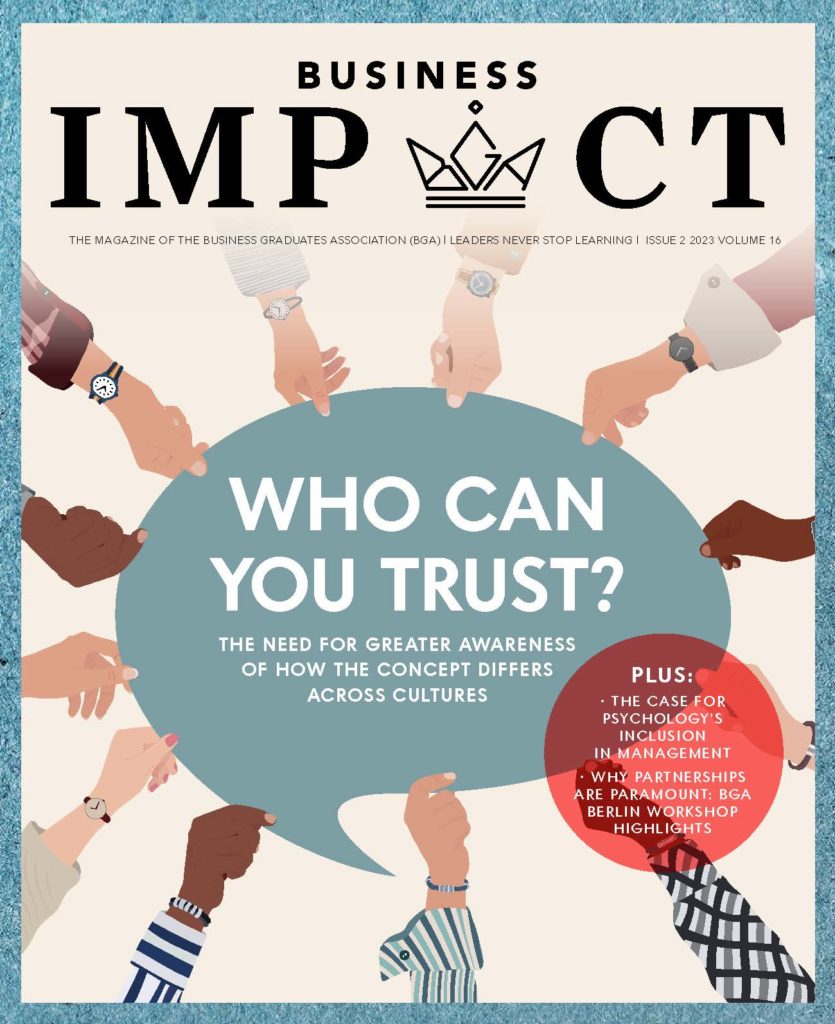We share insights from leading Business School professors who attended AMBA’s 2018 Latin America Conference in Buenos Aires, Argentina, about their Schools’ current strategies, challenges and opportunities. Interviews by Jack Villanueva
Alejandra Falco, Strategic Management Professor, Universidad del CEMA
What challenges do teachers, instructors and professors face when using online technologies in their courses?
The main challenge is to understand that teaching online is not the same thing as teaching face to face. You have to think about the course and your class in a different way. When you teach face to face, you are between the student and the materials so you can see what’s going on in the class, you can see the reactions of the students to what you are saying and the material you are using. This does not happen in the online environment so you can’t make decisions on the spot.
Schools need to help instructors understand that [online learning] is different [to classroom learning] and make sure that they don’t reproduce what they do face to face in an online environment. It needs a transformation.
In terms of the online MBA and studying from distance, do you think the experience, learning and the outcome for these students is the same as for those who learn face to face?
It’s an interesting question because the challenge we face in an online environment is to foster learner-to-learner interaction. It is easy to interact between instructor and learner, but the challenge is the learner-to-learner interaction.
There is something that happens naturally in a face to face environment, so if we can manage this interaction adequately and develop tools to allow the students to interact among themselves, the online option will be richer than the face-to-face option. If we can have the same attributes in an online environment, we add much more flexibility for the student to choose when and how and where he or she wants to study.
Ignacio Alperín, Professor of Creativity and Innovation, Pontificia Universidad Católica
How is business thinking changing around creativity?
Creativity is a process that involves more than one person, it is never an individual idea; it is a communal kind of work. Creativity is the step prior to innovation. Creativity is putting together the correct ideas, innovation is putting together the correct product or service and making it happen in real life.
Every company expects their graduate or postgraduate students to be open to the idea of being creative, working in a different way, of accepting different manners of work ethics that are not traditional. This not only involves those who come in to work for a company, it has a lot to do with leadership as well.
Perhaps there is an issue with expectations versus what actually happens in companies. There are too many bosses and too few leaders. There are a lot of people who tell you what to do but very few people who inspire others to do things. In that regard, creative leadership is also a major subject and companies are slowly coming around to the idea that they need to change their leadership style.
Do you think Business Schools are sufficiently inspiring to instil creativity in their students?
When we’re children, we’re extremely creative and we don’t have limits. We like to explore and ask about everything. In Schools as it stands, the creative spirit is squashed by a system that requires students to be right or wrong.
Creativity is a gift and should be developed like any other talent. We have all been provided with the talent of creativity but when people get to university or Master’s level, they have been kept so far away from their creative juices and, in many cases, it is very difficult to bring them back in touch with themselves and give them inner strength because creativity is a strength.
We are completely and constantly improvising our lives. Companies, for a long time, tended to squash this, but today, organisations realise that they need to be open and think laterally. If the education system can change enough, many of the problems we face today will be gone because people will come up line already living their creative ability throughout their careers.
In your role, are you trying to unlock existing creativity or teach the creativity?
It’s a bit of both. When I find a master’s class with 30 students, most of them are professional people. They think they know everything and have already made it, and in some respects they are right.
They will be future leaders, but it’s sometimes difficult to tell them: ‘I am teaching you and I don’t know everything; perhaps you should relax a bit and question yourself about the facts you thought were correct.’
By unlocking that vault they will find another Pandora’s Box of issues and problems, but if they learn how to handle them, they may find a way to make their work more effective, their company profitable, their life more exciting and more enjoyable; they may go home and feel like having fun with family instead of taking their troubles with them and feeling miserable when they’re not at work.
Part of my job is unlocking those talents, it has to do a lot with people’s fear of being wrong in front of other people. After that, we teach processes, ideas and concepts that can help students unleash creativity in themselves and the people with whom they work.
Is it the Business School’s responsibility to lead students towards an uncertain path?
Many students believe the world is divided into creative and non-creative people. We try to erase all this and explain we are all creative – different types of creative but all creative.
Sebastián Auguste, Director Executive MBA, Universidad Torcuato Di Tella
What are your views on the current global MBA market?
The MBA is the most popular programme within the Business School: about 79% of the applications we receive are for the MBA programme. Demand is growing in Asia, Europe and the US, and it’s increasing in Latin America. The full-time MBA is declining and numbers are increasing in executive and part-time MBA programmes. There is also strong demand for some Master’s degrees such as business analytics.
How is the EMBA faring?
The EMBA is small but it’s growing in many regions. Many students finish at university graduate level and decide to do a speciality such as a masters in analytics or finance, and then they go for the MBA later when they’re older. Young people are trying to gain more technical abilities; older people are trying to gain more general skills.
How popular is the online MBA?
The numbers show that the online MBA is growing. I previously expected the number to grow, but the increase isn’t as great as I expected. There has been a strong increase in the blended format, even in EMBA programmes. Online is coming very strongly but I don’t see the online MBA replacing the experience of the EMBA or the part-time MBA. You have to learn and you have to be there to learn. It’s quite difficult to learn online.
What’s the effect of specialist programmes on the MBA and on
Business Schools?
Specialist programmes are going to relegate the [generalist] MBA. There is going to be a fall in demand from young people wanting to do an MBA, but an increase in older people wanting to do one.
In Latin America, you have very technical and specialised degrees so there is less demand for special programmes. Many universities are moving in this direction of having more general graduate-level study, so you’ll need more specialisation later on.
Carla Adriana Arruda Vasseur, Associate Dean, FDC – Fundação Dom Cabra
Why do you think Business Schools should have a role in social development?
We are the ones who are transforming the leaders of our society. We are working with business managers, leaders, entrepreneurs, company owners, and people who really run the economy of the country. If we don’t have this kind of focus, we will continue to live in a country with a lot of inequalities so it needs to start with us.
How can Business Schools leverage an impact on society?
All Business Schools have some sort of social impact and development in their value prepositions. Talking is one thing, leading by example is another. We need to provoke students to think differently and to do differently. We need to provoke them to really make a change. And it won’t be just about talking and showing them our mission. It has to be in every single class we give, in the projects that we send them on, it has to be included in all our initiatives.
How can Business Schools help students have a more impactful role in the world of tomorrow?
If you look at Business Schools, most of their students are from the upper portion of the social pyramid and we need to show them how they can really make a difference – in every single class and in every single project.
A lot of our students come to us because they want management tools. They want to increase profit in their corporations, they want to better themselves in their careers. And, from day one, they realise we’re concerned about economic development but we’re also very concerned about social development.
Do you work with other Schools to push this idea forward?
We have a partner we’ve been working with on modules and we’re putting an emphasis on that. But I think we can do more. I’ve been talking a lot about that [during this conference] with partners. We need stop considering ourselves as competitors [with other Business Schools] and consider ourselves as ‘co-petitors’ and cooperate more with each other.
Is it a case of starting locally or looking at the bigger picture and effecting change at the top?
Begin with what’s feasible and build up.
We’re starting to shape the leaders of tomorrow. We’re starting with the students of today to [help them] have a deeper understanding of social development and a deeper understating that there are larger problems in the world. But is there an issue with the bigger businesses themselves not recognising it or not recognising it fast enough and therefore the student not having an outlet for what they want to do?
A lot of the boards require their corporations to think about the social side. Some suppliers refuse to supply to organisations that don’t care about these issues and clients are not buying from them.
We, as professors of business corporations, need to set the example.
Michel Hermans, Professor of Human Behaviour and Human Resources, IAE Business School – Universidad Austral
How can Business Schools help students develop skills beyond the analytical tools in the curriculum through action learning?
It’s not only about teaching rational decision making. It’s about helping students anticipate risks and [influence] people who are especially relevant in certain contexts. That’s what we do and this is the added value we consider action learning has. This reflection part is a very important role faculty have.
One thing is to think about is how to evaluate a company in turbulence. Another is to think how a company can actually use what it has – its resources – to transform its strategy for much broader markets. Think about internationalisation and the acquisition of companies in emerging markets, and then present this analysis to senior managers.
Can students themselves better prepare for their careers through action learning?
It depends on the student themselves.
Especially in the Latin American job market, recruiters are looking for ‘plug-and-play’ students so when they roll out of their programme they want students who need little time to be fully functional within the context of their companies.
If they are able to find students who are proactive, and have used this productivity to actually do something within the context of their programme and learn something from that, it’s highly valued.
How important is action learning in fast-tracking understanding around the need for adaptability and evolution within businesses? It’s like moving house. If you don’t lay foundations in the MBA programme (which would be knowledge and analytical skills) it’s hard to start thinking about action learning in the first place.
You have to lay a solid foundation in the first part of the programme and then build on this with follow-up courses. That gives us, as faculty, the confidence that teams are able to benefit from action leaning. We launch most of our projects towards the end of the programme because that’s when students take advantage of the projects they are being offered that they themselves propose.
We’ve seen many students use their action learning projects to move into new career tracks or to find a different job in companies with whom they collaborated for their action learning projects.
If you do a full-time MBA programme and you are away from the job market for a full year, gaining contact with the job market again – with employers and organisational life – is fundamental to a follow-up career.
Juan Pablo Manzuoli, Strategic Marketing Professor and Director of MBA, UCA Business School
What do you consider to be the main disruptive trends students are facing?
I have highlighted deep trends that are not often evident. For example, millennials want the earth, but they don’t have special powers. Loneliness is another powerful trend, as is self-exploration.
What’s next for the MBA?
We have to have a convergence between the needs of people and technology and make an improvement. Make things better. We need to adapt and be flexible in how we think and in our business models. This generation is teaching us how to make improvements in different ways not only with the technology, but with emotions.
Luciana Pagani, Professor of Strategy and Competitiveness, Saint Andrews University
How is the digital age transforming the MBA experience?
Changing behaviours in individuals as learners, and technology, are providing opportunities to deliver a different experience [to students], enabling people to access courses no matter where they are.
What challenges is the digital age presenting to the way Business Schools teach?
The digital age is creating a new world of opportunities for businesses, while also causing a lot of pressure and setting very different type of challenges. Businesses need to change the way they lead.
Technologies have to be implemented and customer experiences are transforming, so at the company level, transformation is amazing but very challenging.
Business Schools have to rethink their value proposition massively. They must consider how they are going to offer something of vital importance to their students to enable them to learn and access the best faculties all over the world, offering a unique experience that blends the best from the physical world and the digital world.
It’s an enormous strategic and operational challenge for universities.
Schools are transforming in terms of content, so all the strategies and management content required to lead in the digital area is being added to traditional content. They are also adding a broader spectrum of elective courses to meet the specific needs of students.
They are forming partnerships with industries, with other universities worldwide and with governments.
They are also transforming their infrastructures in order to provide space for innovation, creativity, and experimentation and they are working across platforms to collaborate, and to enhance their value proposition, with the best faculty, the best universities and the best companies as partners.
Do you think Business Schools rising to the challenges sufficiently quickly, given the current economy?
The challenge of the fourth industrial revolution is too aggressive for everyone. Universities are moving forward, but it would be nicer if they could move faster. However, it’s not easy.
I hope the pace will increase and we will have more and more examples of convergence to the new value proposition in the near future.
Melani Machinea, Professor and Business Development Director, UTDT Business School
Tell us about the development of your specialised master’s degree?
A few years ago, we realised we didn’t have an offering for recent graduates who wanted to pursue a career in business. Either they had to do a Master’s in finance or they had to wait five or six years before they could do an MBA. At the same time, we discovered a need for very specific skills, so we designed a Master’s in management which merges the two sides of the story: business for those who come here from a science background and, for those with a business background the skill set they need for the new corporate world.
We looked at the world. In Europe, there were a lot masters in management programmes which were launched by Business Schools, in addition to their MBAs which are still their flagship programme. In the US, we have seen the emergence of master’s in business analytics programmes. We decided we would have a competitive advantage if we could offer both management and analytics in the same programme.
The first challenge was the type of students we wanted to sign up. We decided early on that we wanted recent graduates or people with little analytical experience who could learn about areas such as programming and coding through the courses that we were going to teach. When we launched, we realised that there were a lot of men in mid-to-higher management, people with 10-15 years of experience, who said they were lacking this expertise and wanted to do the degree. We had to make a decision at this point and we decided to stick to our initial plan of targeting younger professionals, while just offering short courses for more mature professionals.
Do you think the MBA is evolving fast enough or do you think there is so much more that could be done?
I think the MBA is still a flagship programme in Business Schools, and the challenge is to maintain and update it to make it relevant. Our hope is that our students from the Master’s in management and other programmes will come back in five or six years to do their MBAs when they realise they need other skills related to management and strategic leadership.


























